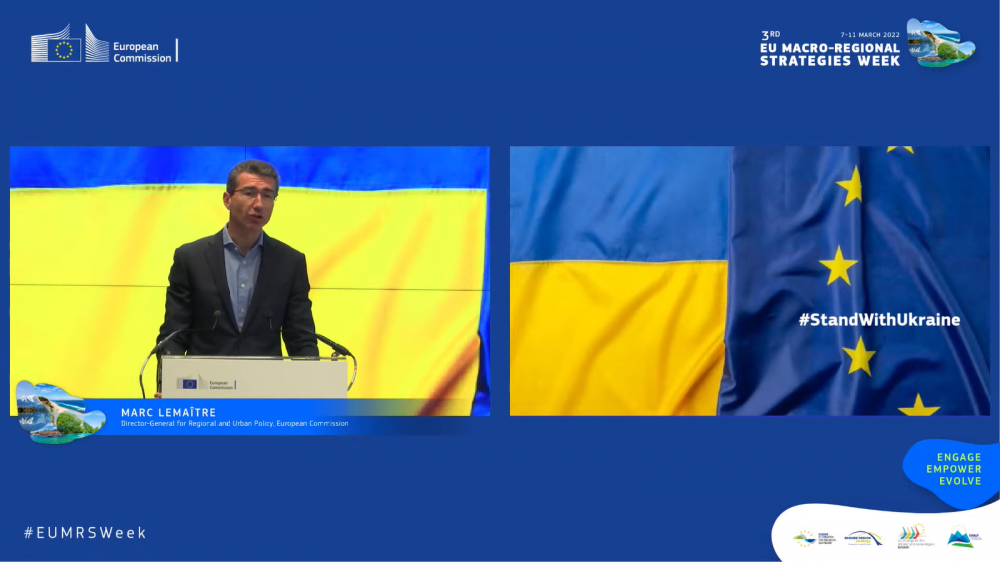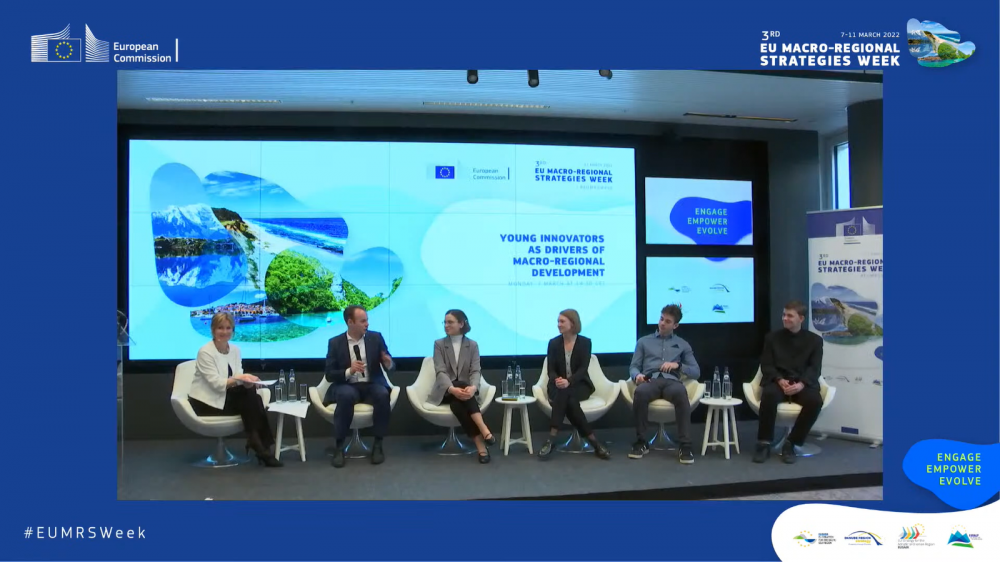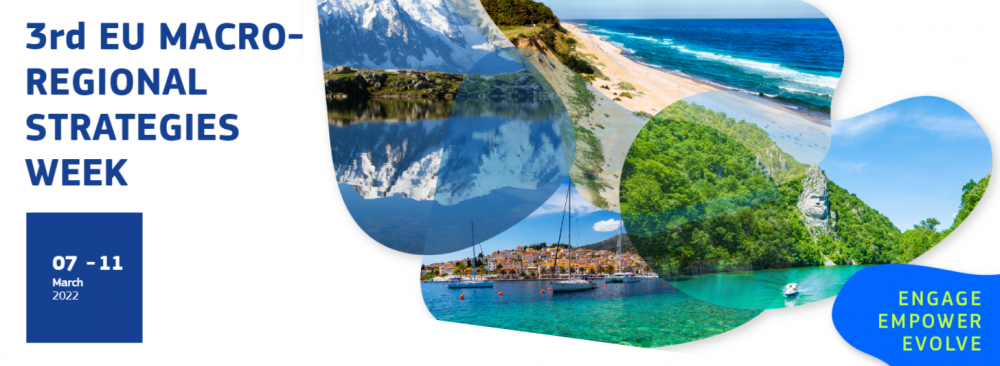News
The EU Macro-Regional Strategies Week explored how the four MRS can further smart and sustainable development
- Details
This year’s EU Macro-Regional Strategies Week focused on Youth, the European Green Deal and Social Change. The event followed the motto Engage, Empower, Evolve, with the aim to engage stakeholders from across the four EU macro-regional strategies (MRS) and the EU institutions, to empower them to take charge of the opportunities offered by the MRS, in order to evolve their macro-regions towards a smart and sustainable future.
The third EU Macro-Regional Strategies Week was organised by the European Commission, Directorate-General for Regional and Urban Policy on 7-11 March 2022, bringing together stakeholders from the four macro-regional strategies, the EUSBSR, the EUSDR, the EUSAIR and the EUSALP. The programme included panel discussions on youth involvement, the European Green Deal and social change, a keynote speech by Commissioner Elisa Ferreira, and various stakeholder sessions. The last day was dedicated to the 14th High Level Group meeting and the meeting of the Presidencies of the four EU MRS and Trio.
In solidarity with Ukraine
The opening session of the week highlighted the solidarity and support of EU for Ukraine – the first non-EU country to coordinate the activities of the EU Strategy for the Danube Region (EUSDR). In his pre-recorded video greeting, Igor Korkhovyi, the Ukrainian national coordinator of the EUSDR, expressed Ukraine’s high regard for European cooperation and pride in having participated in the EUSDR. On behalf of all four MRS, Arnoldas Pranckevičius, the Permanent Representative of Lithuania to the EU, emphasised that Ukraine is currently fighting also for European security and for the survival a rules-based system, and underlined that Russia’s military aggression is an attack on democratic principles and values, and on our commitment to work together for a prosperous and sustainable future.
A message to the MRS
In her keynote speech, Elisa Ferreira, Commissioner for Cohesion and Reforms, expressed the EU’s support for Ukraine and emphasised that societies and alliances built on democracy, trust, and freedom are more resilient and successful. Many of the current challenges are too big to be faced alone, which is why Ferreira considers the MRS to be all the more relevant. According to her, the MRS can provide added value by tailoring EU priorities to each region, helping to prepare the further enlargement of the EU, strengthening cooperation with neighbouring countries, and reinforcing efforts for fairness and inclusion. Ferreira also emphasised, that one of the foremost challenges is to embed the priorities and actions of the MRS in the European and national funds.
“In the Baltic region, the main focus now is to implement the revised Action Plan and deliver on key EU policies, such as the European Green Deal and the digital transition. You have done considerable work on embedding. This has been a marathon and you have shown great endurance. The finishing line is coming into sight. I encourage you to finish in style!” – Elisa Ferreira, Commissioner for Cohesion and Reforms, the European Commission
Panel discussions on Youth, the European Green Deal and Social Change
The program included three different panel discussions dedicated to the main topics of this year’s EU Macro-Regional Strategies Week, namely Youth, the European Green Deal, and Social Change. The first panel discussion addressed opportunities provided by the MRS for the youth to be active in furthering positive change. The European Year of Youth 2022 was seen as essential in promoting and facilitating the participation and engagement of young people in actions aimed at building a more inclusive, digital, and green future. During the panel, Martin Rümmelein, Representative of the Baltic Sea Youth Platform Advocacy Working Group and Initiator of the Baltic Sea Youth Camp, highlighted the role that the EUSBSR can play as a provider of a platform for the youth to express their concerns and ideas.
The second panel discussion focused on the ways MRS can further the implementation of the European Green Deal. The importance of working together and including everyone in the work to address the climate crisis was emphasised. In relation to this, the speakers underlined the special role MRS play in bringing the implementation of the European Green Deal to a local level and adapting it to different local needs and circumstances. The MRS were also seen as an instrument that helps regions to direct public investments and make the best of the resources available.
The third panel discussion explored how the MRS can support the society in going through the changes needed to cope with the major socio-economic and environmental challenges we are facing. The speakers highlighted that a large variety of issues can be addressed by projects, which is why the MRS can have a significant impact by bringing together actors from across the regions and connecting cooperation to funding. The MRS were also considered to play an important role in ensuring that no one is left behind, by targeting issues that concern vulnerable groups of people. The School to Work Project, which was presented during the panel discussion, strives to help the vulnerable groups of early school leavers and young people neither in employment nor in education or training by improving the transition from school to work in the Baltic Sea region.
Stakeholder sessions providing diverse insights
During the week, the themes Youth, the European Green Deal, and Social Change were further explored from various perspectives in sessions organised by different stakeholders of the four MRS, including several of the EUSBSR Policy Areas (PA). PA Spatial Planning coordinator VASAB organised a session discussing how territorial and spatial plans can contribute to the green and digital transition. PA Education highlighted in their session how Youth Guidance Centres help support young adults not employed nor in education or training. Ways maritime digitalisation enables greener, safer, and more efficient shipping were explored in a session held by PA Safe. The role of innovation was, in turn, approached from different perspectives in two sessions organised by PA Innovation. The first discussed how smart specialisation strategies can help further the green transition and sustainable growth, while the second highlighted the importance of empowering women in innovation.
The 14th High Level Group meeting
The High Level Group is an EU-level body comprising official representatives of all countries participating in the MRS and advising the European Commission on the coordination and monitoring of all MRS. The 14th High Level Group meeting, organised during the EU Macro-Regional Strategies Week, focused on how the MRS can contribute to post-Covid recovery and climate goals, especially through the process of embedding MRS priorities and actions in funding instruments. The meeting highlighted the importance of working together with the funding programmes, but also underlined that collaboration is possible only to the extent allowed by the rules and regulations of the programmes. In the end of the meeting the European Citizens Action Service (ECAS) presented their work, emphasising the importance of considering citizens and the civil society especially in times of crisis. It was also reflected how the MRS could utilise the services of ECAS as well as tools, such as crowd sourcing, in policy-making.






